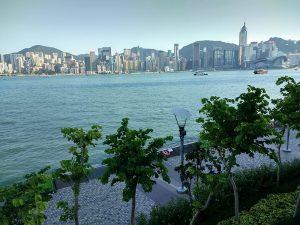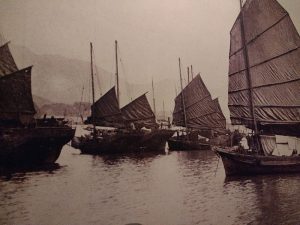 Hong Kong is a set of islands and coastal areas. The town’s name means fragrant harbor, after the sandalwood forests on the island. About seven million inhabitants live there. Hong Kong is one of the largest ports in the world. Because of the port’s limited space and the competition with ports on the Chinese mainland, the port is dropping on the world ranking of ports.
Hong Kong is a set of islands and coastal areas. The town’s name means fragrant harbor, after the sandalwood forests on the island. About seven million inhabitants live there. Hong Kong is one of the largest ports in the world. Because of the port’s limited space and the competition with ports on the Chinese mainland, the port is dropping on the world ranking of ports.
Hong Kong, like the Chinese ports of Guangzhou, Macau and Shenzhen, is located on the delta of the Pearl River, where about 130 million people live. This has been a commercial area for several thousands of years. The Romans came there around the beginning of the first century, Arab traders from the eighth century onwards, the Portuguese settled in Macau in 1557, Dutch and French ships sailed here in the seventeenth century. Englishmen from the East India Company looked for tea, silk, lacquerware and porcelain and brought it to Europe. A very unequal trade balance between China and Europe developed; China exported many products to the West, but imported almost nothing because they did not need the European goods and considered them inferior. But there was one product that the Chinese were eager for: opium. In order to get a grip on China, the East India Company had poppy plants grown on a large scale in India and transported the opium to China. Millions of Chinese became addicted, the country weakened. When the Chinese government turned against opium imports and had boxes of opium burnt, the First Opium War (1839-1842) broke out. The Chinese lost the battle against the Western powers. As a result, China had to accept Western companies to settle in China and to relinquish territory. The island of Hong Kong was taken by the English.
The barren island had few houses, was hot and humid, acted as a safe haven for corsairs and opium smugglers, plagued by typhoons, and lacked drinking water. But Hong Kong was surrounded by deep water and had sheltered berths for ships, making it a very suitable military base and trading port. Later, other areas were added, and many islands. Hong Kong became a British colony, a free port, which attracted many European traders and thousands of Chinese from mainland China. The population grew rapidly.
After the foundation of communist China in 1949, many Chinese fled to Hong Kong. Rapid capitalist development initiated, carried  out by Chinese businessmen and a large, cheap labor army, with long working days and child labor, and no unions standing up for them. The inequality between the rich upper layer and a large, poor population was enormous. Instead of just being a transit port, Hong Kong now also became an industrial area, an exporter of clothing, toys, electronics and films. It also became an important international financial center.
out by Chinese businessmen and a large, cheap labor army, with long working days and child labor, and no unions standing up for them. The inequality between the rich upper layer and a large, poor population was enormous. Instead of just being a transit port, Hong Kong now also became an industrial area, an exporter of clothing, toys, electronics and films. It also became an important international financial center.
Hong Kong was and is the gateway to emerging China. It became one of the richest cities in Asia. It became a hard, unrestrained capitalist city-state, without social protection. Houses are very expensive; many people live in booths without windows. But the city had an independent legal system, good education, and freedom of expression.
In 1997, Hong Kong was transferred from England to China. A transitional arrangement was agreed for a period of fifty years. China became increasingly influential in the government of Hong Kong, much to the dissatisfaction of a large part of the population.




